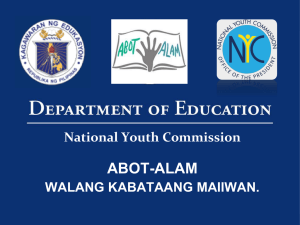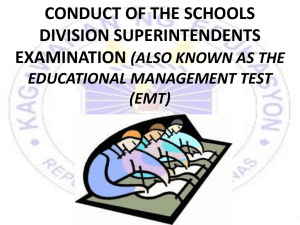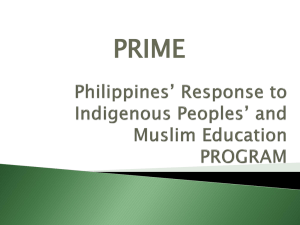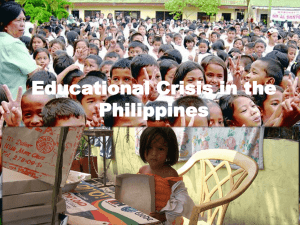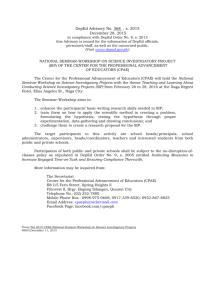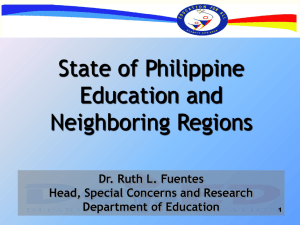Republic of the Philippines
advertisement
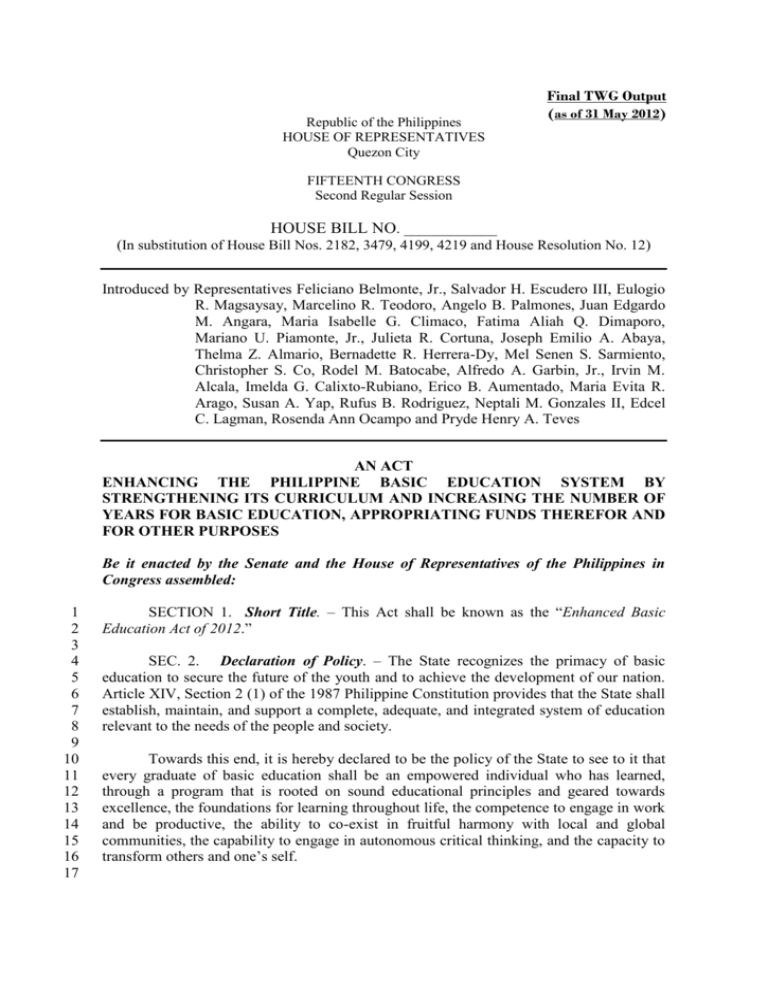
Republic of the Philippines HOUSE OF REPRESENTATIVES Quezon City Final TWG Output (as of 31 May 2012) FIFTEENTH CONGRESS Second Regular Session HOUSE BILL NO. ____________ (In substitution of House Bill Nos. 2182, 3479, 4199, 4219 and House Resolution No. 12) Introduced by Representatives Feliciano Belmonte, Jr., Salvador H. Escudero III, Eulogio R. Magsaysay, Marcelino R. Teodoro, Angelo B. Palmones, Juan Edgardo M. Angara, Maria Isabelle G. Climaco, Fatima Aliah Q. Dimaporo, Mariano U. Piamonte, Jr., Julieta R. Cortuna, Joseph Emilio A. Abaya, Thelma Z. Almario, Bernadette R. Herrera-Dy, Mel Senen S. Sarmiento, Christopher S. Co, Rodel M. Batocabe, Alfredo A. Garbin, Jr., Irvin M. Alcala, Imelda G. Calixto-Rubiano, Erico B. Aumentado, Maria Evita R. Arago, Susan A. Yap, Rufus B. Rodriguez, Neptali M. Gonzales II, Edcel C. Lagman, Rosenda Ann Ocampo and Pryde Henry A. Teves AN ACT ENHANCING THE PHILIPPINE BASIC EDUCATION SYSTEM BY STRENGTHENING ITS CURRICULUM AND INCREASING THE NUMBER OF YEARS FOR BASIC EDUCATION, APPROPRIATING FUNDS THEREFOR AND FOR OTHER PURPOSES Be it enacted by the Senate and the House of Representatives of the Philippines in Congress assembled: 1 2 3 4 5 6 7 8 9 10 11 12 13 14 15 16 17 SECTION 1. Short Title. – This Act shall be known as the “Enhanced Basic Education Act of 2012.” SEC. 2. Declaration of Policy. – The State recognizes the primacy of basic education to secure the future of the youth and to achieve the development of our nation. Article XIV, Section 2 (1) of the 1987 Philippine Constitution provides that the State shall establish, maintain, and support a complete, adequate, and integrated system of education relevant to the needs of the people and society. Towards this end, it is hereby declared to be the policy of the State to see to it that every graduate of basic education shall be an empowered individual who has learned, through a program that is rooted on sound educational principles and geared towards excellence, the foundations for learning throughout life, the competence to engage in work and be productive, the ability to co-exist in fruitful harmony with local and global communities, the capability to engage in autonomous critical thinking, and the capacity to transform others and one’s self. 1 2 3 4 5 6 7 8 9 10 11 12 13 14 15 16 17 18 19 20 21 22 23 24 25 26 27 28 29 30 31 32 33 34 35 36 37 38 39 40 41 42 43 44 45 46 47 48 49 Critical issues and concerns identified by the Department of Education (DepEd) in the current ten (10) years basic education cycle serve as the basis in its quest for the much needed reforms in the basic education system, namely: a) Students are deprived of adequate instructional time due to the congested curriculum especially in subjects such as mathematics, languages and sciences that resulted in low achievement scores of Filipino students in the National Achievement Test as well as in international tests; b) High school graduates are not adequately prepared for the world of work because they are too young to legally enter the labor force, an indication that those who will not go to college would either be unemployed or vulnerable to exploitative labor practices; c) High school graduates are not adequately prepared to pursue higher education as they still have to undergo remedial and high school level classes in colleges and universities; and d) The ten (10) years basic education cycle hinders the recognition of Filipino professionals abroad by virtue of international agreements and standards requiring twelve (12) years of basic education for university admission. To attain an internationally competitive basic education system, the State shall create an enhanced basic education system that is in accord with the nation’s heritage and culture which can generate responsible and productive citizens equipped with the essential competencies and skills for both life-long learning and employment. To achieve its purpose, the State shall: a) give every student an opportunity to receive quality education based on an enhanced and relevant curriculum that is internationally recognized and comparable; and b) change public perception that secondary education is just a preparation for college, rather, it should allow one to take advantage of opportunities for gainful career or employment and/or self-employment in a rapidly changing and increasing globalized environment. SEC. 3. Definition of Terms. – The terms used in this Act are defined as follows: (a) Adult Learners refer to learners aged 25 years old and above who are non-literates, neo-literates who either have had no access to formal education or have reverted to illiteracy; (b) Alternative Learning System refers to a parallel learning system aimed at providing a viable alternative to the existing formal educational instruction. It encompasses both the informal and non-formal sources of knowledge and skills; (c) Auxiliary Medium of Instruction refers to any language other than the prescribed medium of instruction used to facilitate learning and understanding of the content and academic language of the subject areas; (d) Basic Education refers to the education intended to meet basic learning needs which lays the foundation on which subsequent learning can be based. It encompasses kindergarten, elementary and secondary education as well as alternative learning systems for out-of-school learners and adult learners and includes education for those with special needs; (e) Curriculum refers to a systematic group of experiences or sequences of courses or subjects required for graduation or certification in each level of education; -2- 1 2 3 4 5 6 7 8 9 10 11 12 13 14 15 16 17 18 19 20 21 22 23 24 25 26 27 28 29 30 31 32 33 34 35 36 37 38 39 40 41 42 43 44 45 46 47 48 49 50 (f) Elementary Education refers to the second stage of compulsory formal education which is composed of six (6) years of elementary education. The entrance age to this level is typically six (6) years old; (g) Formal Education refers to the systematic and deliberate process of hierarchically structured and sequential learning corresponding to the general concept of kindergarten, elementary and secondary level of schooling. It is composed of a total of thirteen (13) years of schooling. At the end of each level, the learner is expected to earn a certification of competency which is required to enter or advance to the next level; (h) Kindergarten Education refers to the first stage of compulsory formal education which is composed of one (1) year of preparatory education. The entrance age to this level is at least five (5) years old; (i) Medium of Instruction refers to the language used for teaching and learning the school curriculum; (j) Out-of-School Learners refers to school-age children and youth who are unable to avail of the educational opportunities of the formal school system or who have dropped out of the formal elementary or secondary education; (k) Regional or Native Language refers to the speech variety prevailing in a region, area or place; (l) Secondary Education refers to the third stage of formal education. It is noncompulsory and consists of four (4) years of junior high school education and two (2) years senior high school education. The entrance age to the junior and senior high school levels are typically twelve (12) and sixteen (16) years old, respectively; and (m) Education for those with special needs refers to the provision of educational services to those with physical, sensorial and intellectual disabilities, including those with behaviour problems and the gifted and the talented that require modifications of school practices, curricula, programs, special services and facilities. SEC. 4. Enhanced Basic Education Program. – The enhanced basic education program encompasses one (1) year of kindergarten education, six (6) years of elementary education, and six (6) years of secondary education. Secondary education includes four (4) years of junior high school and two (2) years and senior high school education. Basic education shall be delivered in languages understood by the learners as the language plays a strategic role in shaping the formative years of learners. The child’s regional or native language shall be used as the primary medium of instruction from kindergarten up to Grade III. Thereafter, the regional or native language may likewise serve as the auxiliary medium of instruction in the basic education. Students of Filipino nationality enrolled in all types of public schools operating under the enhanced basic education program shall be free from payment of tuition and -3- 1 2 3 4 5 6 7 8 9 10 11 12 13 14 15 16 17 18 19 20 21 22 23 24 25 26 27 28 29 30 31 32 33 34 35 36 37 38 39 40 41 42 43 44 45 46 47 48 49 50 other school fees. Learners of non-Filipino citizenship shall be required to pay the necessary fees as specified by the DepEd. SEC. 5. Curriculum Development. – The DepEd shall formulate the design and details of the enhanced basic education curriculum. To ensure college readiness and to avoid remedial and duplication of basic education subjects, the DepEd shall coordinate with the Commission on Higher Education (CHED) and the Technical Education and Skills Development Authority (TESDA). To achieve an effective enhanced basic education curriculum, DepEd shall undertake consultations with other national government agencies and other stakeholders including, but not limited to, the Department of Labor and Employment (DOLE), Professional Regulation Commission (PRC), private and public schools associations, national student organizations, national teacher organizations, parents-teachers associations, and the chambers of commerce on matters affecting the concerned stakeholders. SEC. 6. Curriculum Consultative Committee. – There shall be created a curriculum consultative committee, chaired by the DepEd Secretary or his/her duly authorized representative and with members composed of, but not limited to, a representative each from CHED, TESDA, DOLE, PRC, Department of Science and Technology (DOST), Department of Trade and Industry (DTI), National Economic Development Authority (NEDA), association of private and public schools, teachers organization, parents-teachers association, and the chamber of commerce. The consultative committee shall oversee the review and evaluation on the implementation of the basic education curriculum and may recommend to the DepEd the formulation of necessary refinements in the curriculum. The chairperson and the members of the consultative committee shall not be entitled to additional compensation in the performance of their function. SEC. 7. Integration of General Education Curriculum Subjects. – Subjects mandated by existing laws and general education curriculum subjects currently being offered in tertiary programs that may hereafter be determined by the DepEd shall be integrated in the enhanced basic education curriculum. SEC. 8. Hiring of Graduates of Science, Mathematics, Statistics and Engineering Courses. – Notwithstanding the provisions of Sections 26, 27 and 28 of Republic Act No. 7836, otherwise known as the Philippine Teachers Professionalization Act of 1994, the DepEd and private education institutions shall hire graduates of science, mathematics, statistics, and engineering degree courses to teach in their specialized subjects in the elementary and secondary education: Provided, That they pass the LET within five (5) years after their date of hiring. SEC. 9. Hiring of Graduates of Technical-Vocational Courses. – Notwithstanding the provisions of Sections 26, 27 and 28 of Republic Act No. 7836, the DepEd and private education institutions may hire graduates of technical-vocational courses to teach in their specialized subjects in the secondary education: Provided, That these graduates possess the necessary certification issued by TESDA: Provided, further, That they undergo appropriate in-service trainings to be administered by DepEd. -4- 1 2 3 4 5 6 7 8 9 10 11 12 13 14 15 16 17 18 19 20 21 22 23 24 25 26 27 28 29 30 31 32 33 34 35 36 37 38 39 40 41 42 43 44 45 46 47 48 49 50 SEC. 10. Hiring of Higher Education Institution Faculty. – Notwithstanding the provisions of Sections 26, 27 and 28 of Republic Act No. 7836, the faculty of higher education institutions (HEIs) shall be allowed to teach general education subjects in the secondary education: Provided, That the faculty must be a holder of a relevant Masters degree: Provided, further, That the faculty must have satisfactorily served for at least five (5) years of full-time service as such faculty. SEC. 11. Career Guidance and Counselling Advocacy. – To properly guide the students in choosing the career tracks that they intend to pursue, the DepEd, in coordination with DOLE, TESDA and CHED, shall regularly conduct career advocacy activities for secondary level students. Notwithstanding the provisions of Section 27 of Republic Act No. 9258, otherwise known as the Guidance and Counseling Act of 2004, career and employment guidance counsellors, who are not registered and licensed guidance counsellors, shall be allowed to conduct career advocacy activities to secondary level students. SEC. 12. Expansion of E-GASTPE Beneficiaries. – The benefits accorded by Republic Act No. 8545, or the Expanded Government Assistance for Students and Teachers in the Private Education Act, shall be extended to the poor but deserving students enrolled under the enhanced basic education. SEC. 13. Appropriations. – The Secretary of Education shall immediately include in the Department’s program the operationalization of the enhanced basic education program, the initial funding of which shall be charged against the current appropriations of the DepEd. Thereafter, the amount necessary for the continued implementation of the enhanced basic education program shall be included in the annual General Appropriations Act. SEC. 14. Transitory Provisions. – The DepEd, CHED and TESDA shall formulate the appropriate strategies and mechanisms needed to ensure smooth transition from the existing ten (10) years basic education cycle to the enhanced basic education (K to 12) cycle. The strategies may cover changes in physical infrastructure, manpower, organizational and structural concerns. Modelling for senior high school may be implemented in selected schools to simulate the transition process and provide concrete data for the transition plan. To manage the initial implementation of the enhanced basic education and the expected low enrolment turnout for HEIs for School Years 2016-2018, the DepEd shall engage in partnerships with HEIs for the utilization of the latter’s human and physical resources. The faculty of HEIs allowed to teach students of secondary education under Section 10 hereof, shall be given priority in hiring for the duration of the transition period. For this purpose, the transition period shall be reckoned from the date of the effectivity of this Act until the end of School Year 2017-2018. SEC. 15. Implementing Rules and Regulations. – Within ninety (90) days after the effectivity of this Act, the DepEd Secretary, CHED Chairperson and TESDA DirectorGeneral shall promulgate the rules and regulations needed for the implementation of this Act. -5- 1 2 3 4 5 6 7 8 9 10 11 12 13 14 15 16 17 SEC. 16. Separability Clause. – If any provision of this Act is held invalid or unconstitutional, the same shall not affect the validity and effectivity of the other provisions hereof. SEC. 17. Repealing Clause. – Pertinent provisions of Batas Pambansa Blg. 232 or the Education Act of 1982, Republic Act No. 9155 or the Governance of Basic Education Act of 2001, Republic Act No. 9258, Republic Act No. 8545, Republic Act No. 7836, Republic Act No. 1425 or the Inclusion in the College Curricula the Life, Works and Writings of Jose Rizal, and all other laws, decrees, executive orders and rules and regulations contrary to or inconsistent with the provisions of this Act are hereby repealed or modified accordingly. SEC. 18. Effectivity Clause. – This Act shall take effect fifteen (15) days after its publication in at least two (2) newspapers of general circulation. Approved, -6-
